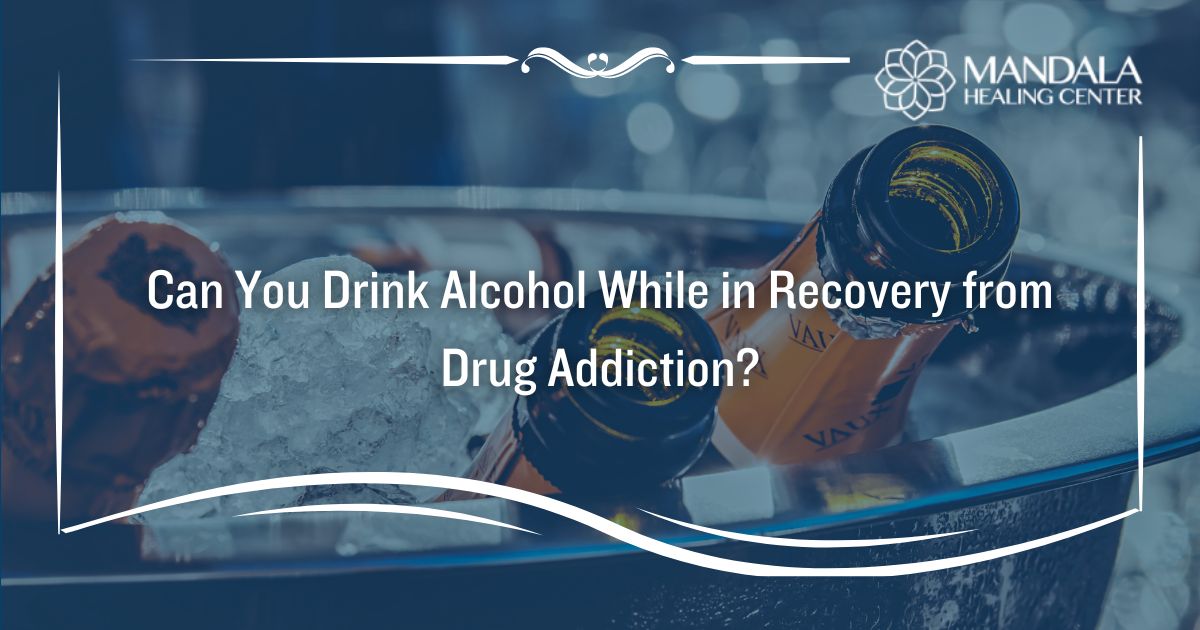Recovery from drug addiction is a challenging process that requires lifelong dedication, ongoing support, and significant lifestyle changes. If you or someone you know is in the process of recovering from drug addiction, you may have found yourself asking, “Should recovering addicts drink alcohol?”
While it may not seem like the two are related, drug and alcohol abuse share many of the same triggers, and therefore it is advised that those in recovery from drug addiction practice total abstinence from drinking alcohol to prevent relapse and support long-term recovery.
What Are the Risks?
Alcohol is an addictive substance that affects the central nervous system by altering mood, behavior, and brain function. For those in recovery from drug addiction, consuming alcohol can pose several risks:
Cross-Addiction
Even if alcohol was not the primary substance of abuse, it can activate similar reward pathways in the brain, leading to cross-addiction or alcohol use disorder.[1]
Worsening Mental Health
Alcohol can heighten underlying mental health issues such as depression, anxiety, and PTSD, which may lead to a strong desire to self-medicate with drugs or alcohol.
Impaired Judgment
According to the National Institute on Alcohol Abuse and Alcoholism (NIAAA), alcohol impairs the brain’s judgment centers and may lead to poor decision-making and relapse. [2]
Health Risks
Alcohol consumption poses significant health risks, particularly for those with a history of substance abuse, including liver damage, decreased brain function, negative side effects when combined with medications.
Alcohol-Induced Relapse
Alcohol can trigger cravings and heighten the likelihood of relapse, especially if alcohol was previously used alongside drugs.
Lifestyle Considerations
Addiction treatment for drug abuse involves lifestyle changes that alcohol may interfere with, such as:
- Behavioral Patterns: Addiction recovery involves breaking old patterns of behavior. Introducing alcohol can re-establish old habits and rituals associated with substance use, undermining progress and increasing the chance of relapse.
- Emotional Stability: Recovery often requires individuals to develop new coping mechanisms for dealing with stress, anxiety, and other emotional challenges. Alcohol can disrupt this process by providing a new way for individuals to self-soothe or self-medicate when stressed.
- Social Factors: Drinking alcohol can lead to re-engaging with social circles and environments that encourage drug use.
What Can I Do Instead?
For individuals recovering from drug addiction, avoiding alcohol may be necessary to maintain sobriety and support long-term recovery. Choosing alternatives to drinking alcohol supports the journey of recovery from drug addiction by promoting overall health, reducing stress, and fostering a positive lifestyle.
Some alternatives include:
Regular Exercise
Physical activity is known to improve overall health and decrease stress – a common trigger for relapse. Participating in regular exercise such as walking, yoga, cycling, or swimming can provide a positive outlet throughout recovery.
Mindfulness Practices
Mindfulness practices, such as meditation and deep breathing exercises help manage cravings, reduce anxiety, and improve overall well-being during recovery.
Explore Your Creativity
Creative activities like painting, writing, or crafting provide a therapeutic way to express emotions and reduce stress, offering an outlet for feelings that may have previously been numbed or ignored through substance use.
Join a Support Group
Support groups like Alcoholics Anonymous (AA) or Narcotics Anonymous (NA) provide a safe environment to share experiences and receive encouragement from like minded individuals who understand the challenges of addiction recovery.
Therapy
Individual or group therapy sessions offer a structured approach to address underlying issues contributing to addiction and help individuals develop coping skills, manage triggers, and maintain motivation for sobriety.
Try a Mocktail
For many, drinking alcohol is a social activity. Next time out with friends or family, try sipping on a mocktail, or non-alcoholic beer and wine.
Build Healthy Relationships
Surrounding yourself with family, friends, and peers who support sobriety can help when committing to a sober lifestyle.
I Don’t Think Alcohol Will Affect my Recovery – What Should I Consider?
The decision to drink alcohol while in recovery from drug addiction is a personal one. If you are considering drinking alcohol throughout your recovery, consider the following when making your decision:
- History of Addiction: Reflect on past struggles with drug addiction and how alcohol use may impact recovery.
- Triggers and Cravings: Identify potential triggers that could lead to cravings or relapse if using alcohol.
- Support System: Ensure you have a support network in place throughout the recovery process.
- Personal Goals: Decide if your desire to drink interferes with personal goals for sobriety and overall quality of life.
- Professional Help: Consider reaching out to a healthcare professional or therapist to help you make informed decisions about alcohol consumption throughout recovery.
Have a Plan in Place
For those in drug addiction recovery who choose to drink alcohol, it is essential to do the following:
- Set Boundaries: Set limits on the amount and frequency of alcohol consumption to avoid triggering cravings.
- Have a Support Network: Have a sponsor or therapist to reach out to when cravings or triggers arise.
- Avoid High-Risk Situations: Avoid situations or places where alcohol is the center of the event or activity to reduce temptation and maintain sobriety.
Seek Treatment at Mandala Healing Center
If you or someone you know is struggling with substance use disorder, help is available. Our dedicated team of professionals at Mandala Healing Center is here to help you get back to a healthy and balanced life. Our treatment programs are completely personalized to fit you and your needs.
Contact us today to learn more about our treatment options and get started on your path to healing today.
References:
- American Psychological Association: An exploratory study of gambling cross addictions.
- National Institute on Alcohol Abuse and Alcoholism (NIAAA): Can You Drink Alcohol While in Recovery from Drug Addiction?












